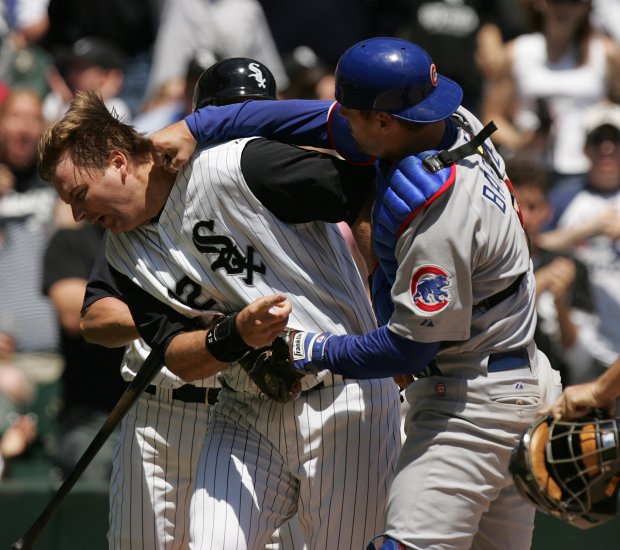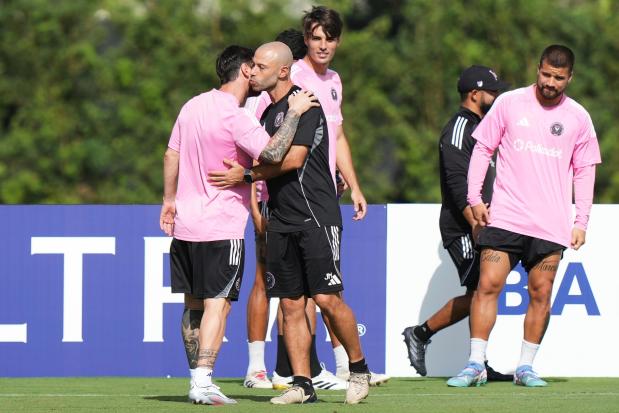The White Sox hope they’ve turned the corner after their historically bad 3-22 start and begin a six-game trip Friday at Yankee Stadium, while the Cubs try to get their offense back on track while dealing with more injuries following a 3-3 trip.
The Sox’s next 13 games will be against the American League East, considered the best division in baseball. The Cubs continue a four-game series against the Pirates before a rematch against the mighty Atlanta Braves, who shut them out in back-to-back games this week while winning two of three games in Atlanta.
Every Friday during the regular season, Tribune baseball writers will provide an update on what happened — and what’s ahead — ahead for the Cubs and White Sox. Want more? Sign up for our new newsletters.
José Cuas trip to Triple-A Iowa provided a needed reset
No player wants to be sent to the minors leagues, especially after making an opening-day roster.
But right-hander José Cuas realized a trip to Triple A was what he needed to get back on track and regain confidence. Cuas, 29, struggled in his first five appearances of the season and was optioned to Iowa after allowing eight runs and 10 hits in six innings.
The Cubs recalled Cuas in Pittsburgh and optioned him back to Iowa after one appearance, however, their continuing injury woes resulted in him never leaving because of Adbert Alzolay going on the injured list with a right forearm strain. Cuas was at the team’s hotel in Pittsburgh on Sunday prepared to fly to Syracuse, New York the next morning to join Iowa when he received a call telling him he needed to get to PNC Park immediately so he could be on the Cubs’ charter to Atlanta.
“I had to regain my confidence and feel like I lost my confidence,” Cuas said this week. “Obviously, not the start I wanted, the start I drew up. But it was good for me to go down and just regain the confidence that makes me who I am when I’m up here. I never want to be demoted. But I’m glad it happened early in the season where I still had the rest of the season in front of me.”
In two appearances since returning, Cuas has thrown four shutout innings with two hits and two walks allowed along with three strikeouts. Cuas’ slider is the key to his success, which he got away from during his first big-league stint this year. He couldn’t pinpoint when lost confidence in his slider but believes the pressure got to him earlier this season, causing him to abandon it in outings when he wasn’t throw it competitively around the zone.
The pitch became a focal point during his month in Triple A, and he knows he must consistently use it to generate strikes to be successful out of the Cubs’ bullpen.
“I was throwing it in every count, obviously, I want to put up the numbers there,” Cuas said. “But for me, my main focus was the confidence and the slider. In the big leagues, I need to be able to throw it a lot more than I did in the past and I’m happy with the progress we made. Obviously, the more I throw it, the more comfortable I got with it and I’m ready to show it off.”
Putting the ‘fast’ in fastball
Pittsburgh starter Paul Skenes, who faces the Cubs Friday at Wrigley Field after making his major league debut against them Saturday at PNC Park, threw a 101 mph fastball on his first pitch and had 17 pitches of 100 mph or higher. That was tied for the third-highest of any player in his debut since the pitch-tracking era began in 2008. All but one of those triple-digit pitches came in the first two innings of an 84-pitch outing that lasted only four innings.
Skenes’ four-seam fastball has been clocked at 102 mph, a number that White Sox closer Michael Kopech has reached in the big leagues. So how high can it climb?
“I do think there are physical capabilities that will be hard to surpass,” Kopech said. “I don’t know what that is, but I don’t think we’ve seen it yet. We’ve seen other guys hit 104. We’ve seen (Aroldis) Chapman hit 105, and (Jordan) Hicks hit 105.”
Suffice to say the days when a 100 mph fastball was considered a rarity are over.
“I think we’ll see that trend go up and we’ll see more and more guys over 100 in the next few years,” Kopech said. “Then we might see what the human body is capable of. But I don’t think we’ve seen it yet.”
In February, Washington Nationals general manager Mike Rizzo had 11 signs installed behind home plates at their spring training facility in Florida for pitchers to read during their throwing sessions. His not-so-subtle message: “I Don’t Care How Fast You Throw Ball Four.”
While velocities continue to climb, the need for control of those fastballs is greater than ever since smart hitters with good scouring reports can sit on them. Kopech threw eight pitches of either 100 or 101 mph Tuesday night against the Nationals, six of which were called balls. The Nationals didn’t swing his first 18 pitches, walking twice with one strikeout as Kopech grew more irate.
“I put myself in a tough situation and let my emotions get the best of me for a second and suffered the consequences of not being in the moment,” Kopech said.
Kopech recovered and got out of the inning without a run being scored. He threw only one 100 mph pitch the next day in a 33-pitch inning, but struck out two and walked two in notching the save.
Number of the week: 2
The Cubs are the only team in the majors with two qualified starting pitchers with an ERA under 2.00 — Shota Imanaga (0.96) and Javier Assad (1.49). Jameson Taillon would also meet the mark with a 1.61 ERA through five starts, but he hasn’t thrown enough innings to qualify. The last time the Cubs had two starting pitchers (defined as more than 50% of their games as a starter) with sub-1.50 ERAs at the same time: Hippo Vaughn (1.48 ERA) and Phil Douglas (1.47 ERA) in June 1919.
Week ahead: Cubs
- Friday: vs. Pirates, 1:20 p.m., Marquee
- Saturday: vs. Pirates, 1:20 p.m., Marquee
- Sunday: vs. Pirates, 1:20 p.m., Marquee
- Monday: off
- Tuesday: vs. Braves, 6:40 p.m., Marquee
- Wednesday: vs. Braves, 6:40 p.m., Marquee
- Thursday: vs. Braves, 1:20 p.m., Marquee
As the Cubs slowly begin getting healthy is some areas, their rotation’s depth gives manager Craig Counsell some options on how to use right-handers Hayden Wesneski and Ben Brown. Brown pitched two innings in relief during Wednesday’s series finale in Atlanta while Wesneski pitched three innings in Monday’s series opener at Truist Park. Counsell considers both of them out getters as the Cubs look to maximize their flexibility.
Wesneski’s and Brown’s versatility, and success this year both pitching in relief and starting, allows the Cubs to maneuver the rotation as needed to build in extra rest with both pitchers still stretched out enough to make that possible. Monday’s off day will help with that, too, in how they want to align the rotation with the Cubs slated to play 13 straight games. Left-hander Jordan Wicks (left forearm strain) is also getting closer to returning. He will throw live batting practice Friday at Wrigley Field, a likely precursor to him beginning a rehab assignment.
Week ahead: White Sox
The Sox have won eight of their last 12 games, and the bullpen has been one of the big reasons for the recent improvement. They’ve posted a combined 2.23 ERA over the last 13 games, including four hitless innings Wednesday in a 2-0 win over the Nationals.
“Just keeping the team in the ballgame,” starter Garrett Crochet said. “And the way that our bullpen has been going lately, as soon as I handed it off, I knew it was kind of a win in the bag.”
A “win in the bag” is not a statement typically attached to the Sox bullpen, which entered Thursday ranked 28th with 4.63 walks per 9 innings. Michael Soroka, whose 6.39 ERA was the worst of any starter with 40 or more innings, moves to the pen this weekend in New York after his demotion from the rotation.
What we’re reading this morning
– Chicago White Sox move Michael Soroka to the bullpen: ‘A lot of it is the mentality to what it takes to be here’
- Chicago White Sox split doubleheader as Andrew Vaughn homers twice — but Bryan Ramos leaves with quad tightness
- Column: Brief scoreboard malfunction for Chicago White Sox induces temporary panic for modern-day baseball fan
This week in Chicago baseball
May 20, 2006: AJ Pierzynski and Michael Barrett fight during a Cubs-White Sox game
The punch occurred in the second inning of a City Series game at U.S. Cellular Field after A.J. Pierzynski collided hard with Michael Barrett at the plate while scoring on a sacrifice fly to shallow left. Pierzynski beat Matt Murton’s throw, but with today’s rules, he would have scored anyway, assuming a managerial challenge, because catchers no longer are allowed to block the plate without the ball.
After getting up, Pierzynski slapped the plate and nudged Barrett while retrieving his helmet. Barrett reacted by clocking Pierzynski in the jaw, prompting the melee. Barrett’s defense was that he thought Pierzynski was walking toward him in a threatening manner after the collision.
“The way I look at it is, if I’m out walking down the street and somebody knocks me down and I get back up and he’s standing over me or coming back at me again, what are you going to do?” Barrett said.
Pierzynski said Barrett snapped at him before the punch, saying, “I didn’t have the ball, bitch.” Barrett denied saying anything.
MLB ultimately sided with Pierzynski. Barrett received a 10-game suspension and undisclosed fine, while Pierzynski received only a $2,000 fine. Sox outfielder Brian Anderson received a five-game suspension and $3,000 fine for his part in the ensuing bench-clearing brawl, while Sox coach Joey Cora got two games and an undisclosed fine. The punch also had several mini-plots involving Sox manager Ozzie Guillen, who later claimed Cubs pitcher Ryan Dempster said Cora bit Jacque Jones on the foot.
“Wow, when you’re in the ballgame, you have shoes on,” Guillen said. “If Joey Cora is going to bite somebody, I hope he’s not dumb enough to try and get his feet. If you’re going to bite him, bite him in his cheek, in the ribs or someplace else, in the stomach. But if you pick the foot, that’s the wrong place to bite somebody.”
Dempster denied saying it. Cora denied biting anyone.
Quotable
“It’s not my job to agree or disagree with any of the decisions made. It’s my job to go out there and be an animal. It’s what I always prided myself on and I think I got away from that a little bit.” — Soroka on his demotion to the bullpen





